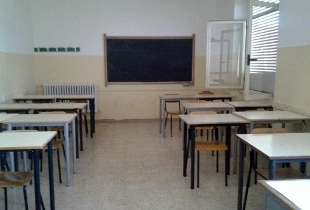- Unicef: childhood vaccines not delivered due to the pandemic
- WHO, cases of contagion among children have increased sevenfold
Share
13 August 2020A tour of the world from school to school; from class to class. This is what WHO / Unicef did when they collected the data in the WHO / UNICEF Joint Monitoring Program (JMP). An alarming picture arises: 43% of schools around the world did not have, in 2019, access to basic services for washing hands with soap and water, a key condition for schools to be able to operate safely in the in the midst of the COVID-19 pandemic."More than a third of these children - 295 million - come from sub-Saharan Africa. In less developed countries - declares the President of UNICEF Italy Francesco Samengo - 7 schools out of 10 do not have the possibility to have their hands washed and not they have toilets and water
Other key figures from the report: Of the 818 million children, 355 million went to schools that had facilities with water but no soap, and 462 million to schools that had no facilities or water available to wash their hands.
At the start of the pandemic in the 60 countries at highest risk of health and humanitarian crises, 3 out of 4 children did not have sanitation.
And again: one in 3 schools in the world had little or no drinking water at all; 698 million children did not have basic sanitation in their school.
"The global closure of schools since the start of the COVID-19 pandemic has represented an unprecedented challenge to children's education and well-being," said UNICEF Director General Henrietta Fore. "We must give priority to children's learning. This means - continues Fore - to ensure that schools are safe when reopening, even with access to hand hygiene, clean drinking water and safe sanitation".
The report identifies several resources needed for Covid-19 prevention and control in schools, including 10 immediate actions and safety to-do lists. It builds on the guidelines on safe reopening of schools issued by UNESCO, Unicef, WFP and the World Bank, with practical advice for national and local authorities on how to prepare for the safe reopening of schools and keep children on their return at school. The guidelines include several protocols related to water, health and hygiene, hygiene behaviors, use of personal protective equipment, cleaning and disinfection, as well as providing access to clean water, hand washing stations with soap and to safe toilets. UNICEF and WHO are committed to achieving equal access to adequate water, health and hygiene services around the world. The agencies recently launched a joint initiative, Hand Hygiene for All, to support the most vulnerable communities with the means to protect their health and the environment. The initiative brings together international partners, national governments, the public and private sector and civil society to ensure the availability of affordable products and services, especially in disadvantaged areas.
"Access to water, sanitation and sanitation is essential for effective infection prevention and control in all environments, including schools," said Tedros Adhanom Ghebreyesus, WHO Director-General. "must be a focal point of government strategies for the reopening and safe operation of schools during the ongoing global Covid-19 pandemic."

